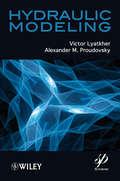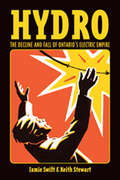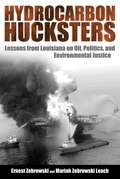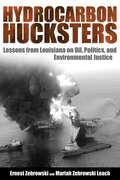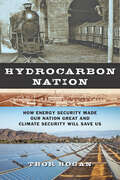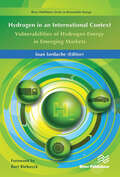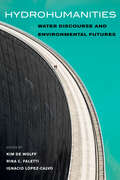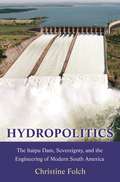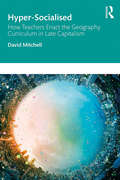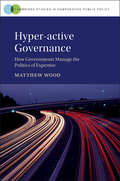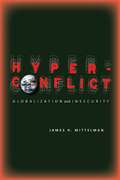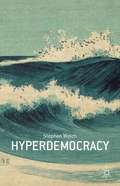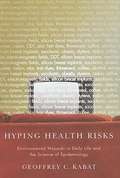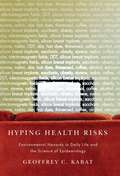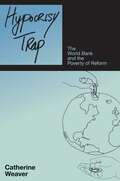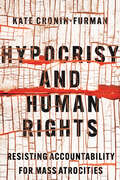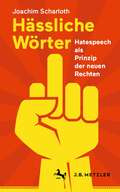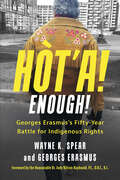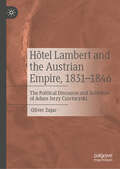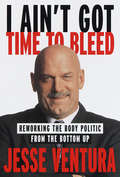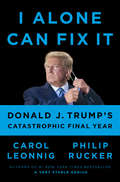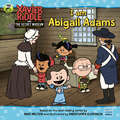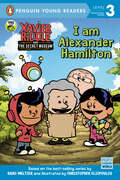- Table View
- List View
Hydraulic Modeling
by Victor M. Lyatkher Alexander M. ProudovskyWater. Except for air, it is the most important ingredient to all life on Earth. It surrounds us every day. We are literally bathed in it, we cook our food with it, and we need a steady stream of it in our bodies every single day just to survive. But water, and the study of it, is one of the most important and unheralded branches of engineering, affecting every other aspect of engineering in almost every industry. We harness its power for energy, we inject massive blasts of it into the earth to extract oil, gas, and minerals, and we use it in nearly every single industrial application, including food processing, refining, manufacturing, and waste disposal, just to name a few. Hyraulic modeling is, essentially, the understanding and prediction of fluid flow and its applications in industrial, municipal, and environmental settings, whether in a creekbed, locked in the pores of rocks deep in the earth, or in the ocean. Mathematical models, which started out with mechanical pencils and drafting tables originally, have been increasingly relied upon over the last few decades, due to the invention, growth, and refinement of computers. Physical modeling, however, is still practiced in laboratories, and it is the intersection of physical and mathematical modeling of fluid flow that is most successful in creating models that are safer, less costly, and are better for the environment. Hydraulic Modeling introduces and explores this incredibly important science, from the most basic tenets to valuable real-world applications that are used in industry today. It is the only volume on the market to offer a thorough coverage of the subject without adding lots of useless fluff or inapplicable appendices. It is a must-have for any engineer, scientist, or student working with hydraulic modeling, as a daily reference or a textbook.
Hydro: The Decline and Fall of Ontario's Electric Empire
by Jamie Swift Keith Stewart“Nothing is going to go wrong.” -Mike Harris, 2001 Privatization of power soon became one of the biggest political disasters in Ontario history. Hydro reveals a train wreck that was decades in the making. First there was blind faith in the nuclear option, steeped in ecological arrogance. Then came the promise of marketplace magic. Jamie Swift and Keith Stewart tell the tale of how it unfolded. It’s a dramatic story of the greed, intrigue, and resistance that led to the dismantling of Canada’s largest crown corporation. A crucial part of the story is how Ontario ignored thirty years of green arguments for conservation and renewable energy. Based on interviews with former premiers, Hydro insiders, and grassroots activists, Hydro will intrigue anyone wondering how to keep the lights on without frying the planet.
Hydrocarbon Hucksters: Lessons From Louisiana on Oil, Politics, and Environmental Justice
by Ernest Zebrowski Mariah Zebrowski LeachHydrocarbon Hucksters is the saga of the oil industry's takeover of Louisiana--its leaders, its laws, its environment, and, by rechanneling the flow of public information, its voters. It is a chronicle of mindboggling scientific and technical triumphs sharing the same public stew with myths about the "goodness" of oil and bald-faced public lies by politicians and the captains of industry. It is a story of money and power, greed and corruption, jingoism and exploitation, pollution and disease, and the bewilderment and resignation of too many of the powerless. Most importantly, Hydrocarbon Hucksters is a case study of what happens when a state uncritically hands the oil and petrochemical industries everything they desire. Today, Louisiana ranks at or near the bottom of the fifty states on virtually every measure related to the quality of life--income, health, education, environment, public services, public safety, physical infrastructure, and vulnerability to disasters (both natural and man-made). Nor, contrary to the claims of the hydrocarbon sector, has there been much in the way of job creation to offset all of this social grief. The authors (one a scientist, the other an environmental lawyer) have woven together the science, legal history, economic issues, and national and global contexts of what has happened. Their objective is to raise enough national awareness to prevent other parts of the United States from repeating Louisiana's historical follies. The authors are uncle and niece, a generation apart, who have melded their conclusions from two separate tracks.
Hydrocarbon Hucksters: Lessons from Louisiana on Oil, Politics, and Environmental Justice
by Ernest Zebrowski Mariah Zebrowski LeachHydrocarbon Hucksters is the saga of the oil industry's takeover of Louisiana—its leaders, its laws, its environment, and, by rechanneling the flow of public information, its voters. It is a chronicle of mindboggling scientific and technical triumphs sharing the same public stew with myths about the “goodness” of oil and bald-faced public lies by politicians and the captains of industry. It is a story of money and power, greed and corruption, jingoism and exploitation, pollution and disease, and the bewilderment and resignation of too many of the powerless. Most importantly, Hydrocarbon Hucksters is a case study of what happens when a state uncritically hands the oil and petrochemical industries everything they desire. Today, Louisiana ranks at or near the bottom of the fifty states on virtually every measure related to the quality of life—income, health, education, environment, public services, public safety, physical infrastructure, and vulnerability to disasters (both natural and man-made). Nor, contrary to the claims of the hydrocarbon sector, has there been much in the way of job creation to offset all of this social grief. The authors (one a scientist, the other an environmental lawyer) have woven together the science, legal history, economic issues, and national and global contexts of what has happened. Their objective is to raise enough national awareness to prevent other parts of the United States from repeating Louisiana's historical follies. The authors are uncle and niece, a generation apart, who have melded their conclusions from two separate tracks.
Hydrocarbon Nation: How Energy Security Made Our Nation Great and Climate Security Will Save Us (The Johns Hopkins University Studies in Historical and Political Science #133)
by Thor HoganUnderstanding the complex history of US fossil fuel use can help us build a sustainable future.In Hydrocarbon Nation, Thor Hogan looks at how four technological revolutions—industrial, agricultural, transportation, and electrification—drew upon the enormous hydrocarbon wealth of the United States, transforming the young country into a nation with unparalleled economic and military potential. Each of these advances engendered new government policies aimed at strengthening national and economic security. The result was unprecedented energy security and the creation of a nation nearly impervious to outside threats. However, when this position weakened in the decades after the peaking of domestic conventional oil supplies in 1970, the American political and economic systems were severely debilitated. At the same time, climate change was becoming a major concern. Fossil fuels created the modern world, yet burning them created a climate crisis. Hogan argues that everyday Americans and policymakers alike must embrace the complexity of this contradiction in order to help society chart a path forward. Doing so, Hogan explains, will allow us to launch a critically important sustainability revolution capable of providing energy and climate security in the future. Hydrocarbon Nation provides reasons to believe that we can succeed in expanding on the benefits of the Hydrocarbon Age in order to build a sustainable future.
Hydrogen in an International Context: Vulnerabilities of Hydrogen Energy in Emerging Markets
by Ioan IordacheHydrogen in an International Context: Vulnerabilities of Hydrogen Energy in Emerging Markets describes strategies and developments for hydrogen civilization efforts realised by various stakeholders such as authorities, institutes, research, industry, and individuals, in different countries and at different stages of the development cycle. Through their contributions, the chapter authors in this book propose a new approach to actual and relevant topics of interest, generically called the hydrogen economy and civilization.Hydrogen vulnerabilities is a topic that includes new challenges that face the hydrogen energy market. Weaknesses for the hydrogen stakeholder are becoming more refined, and it is necessary to be an active and sensitive player to understand these. A prosperous development of hydrogen will require the assimilation of numerous, diverse and unfamiliar contexts. Challenges for hydrogen will not only be in scientific, technical, economical or public acceptance, but challenges also lie in the genesis of this topic and the neglect of some aspects, however marginal, which negatively influence the desired hydrogen developed.This book informs the reader about the status of hydrogen energy in the international market, and it includes a series of examples and case studies about hydrogen activities in various countries. Thus, due to the synergy of this library of contexts, the reader should be able to reach a level of intuition enabling them to see the strengths and weaknesses of hydrogen.
Hydrohumanities: Water Discourse and Environmental Futures
by Kim De Wolff, Rina C. Faletti and Ignacio López-CalvoA free open access ebook is available upon publication. Learn more at www.luminosoa.org. Discourse about water and power in the modern era have largely focused on human power over water: who gets to own and control a limited resource that has incredible economic potential. As a result, discussion of water, even in the humanities, has traditionally focused on fresh water for human use. Today, climate extremes from drought to flooding are forcing humanities scholars to reimagine water discourse. This volume exemplifies how interdisciplinary cultural approaches can transform water conversations. The manuscript is organized into three emergent themes in water studies: agency of water, fluid identities, and cultural currencies. The first section deals with the properties of water and the ways in which water challenges human plans for control. The second section explores how water (or lack of it) shapes human collective and individual identities. The third engages notions of value and circulation to think about how water has been managed and employed for local, national, and international gains. Contributions come from preeminent as well as emerging voices across humanities fields including history, art history, philosophy, and science and technology studies. Part of a bigger goal for shaping the environmental humanities, the book broadens the concept of water to include not just water in oceans and rivers but also in pipes, ice floes, marshes, bottles, dams, and more. Each piece shows how humanities scholarship has world-changing potential to achieve more just water futures.
Hydropolitics: The Itaipu Dam, Sovereignty, and the Engineering of Modern South America (Princeton Studies in Culture and Technology #20)
by Professor Christine FolchAn in-depth look at the people and institutions connected with the Itaipu Dam, the world’s biggest producer of renewable energyHydropolitics is a groundbreaking investigation of the world’s largest power plant and the ways the energy we use shapes politics and economics. Itaipu Binational Hydroelectric Dam straddles the Paraná River border that divides the two countries that equally co-own the dam, Brazil and Paraguay. It generates the carbon-free electricity that powers industry in both the giant of South America and one of the smallest economies of the region. Based on unprecedented access to energy decision makers, Christine Folch reveals how Paraguayans harness the dam to engineer wealth, power, and sovereignty, demonstrating how energy capture influences social structures.During the dam’s construction under the right-wing military government of Alfredo Stroessner and later during the leftist presidency of liberation theologian Fernando Lugo, the dam became central to debates about development, governance, and prosperity. Dams not only change landscapes; Folch asserts that the properties of water, transmuted by dams, change states. She argues that the dam converts water into electricity and money to produce hydropolitics through its physical infrastructure, the financial liquidity of energy monies, and the international legal agreements managing transboundary water resources between Brazil and Paraguay, and their neighbors Argentina, Bolivia, and Uruguay.Looking at the fraught political discussions about the future of the world’s single largest producer of renewable energy, Hydropolitics explores how this massive public works project touches the lives of all who are linked to it.
Hyper-Socialised: How Teachers Enact the Geography Curriculum in Late Capitalism
by David MitchellHyper-socialised explores the challenges of late capitalist times for education systems, schools and teachers. It looks at how trends of accountability, ‘teaching to the test’, using pupil voice and reliance on network technologies are all connected to powerful social and economic forces, shaping the curriculum as it is taught in classrooms. Such forces threaten to overwhelm teachers but, in the right hands, they can also be harnessed to create, influence and teach a truly powerful curriculum for their students. Presenting a historical view of curriculum change, the book examines how society, curriculum and teachers are linked. Using geography as an illustrative subject, the chapters investigate what influences teachers, to what extent they are in control of the curriculum, and what else is shaping it. Divided into two parts, it offers An in-depth exploration of the relationship between society, teachers and the curriculum, including that what and how to teach remain wide open to debate Evidence-based research into the significance and implications of ‘hyper-socialised’ curriculum enactment for teachers and teacher education Four case study ‘portraits’ of geography departments and personal curriculum stories of each Head of Department Insights into the nature of teaching as a profession and how a crisis of teacher recruitment and retention may be addressed. Written in clear and accessible terms, this book is an essential resource for teacher educators, subject teachers, headteachers and educational researchers who want to understand how and why schools and teaching are changing – and what this means for them.
Hyper-active Governance: How Governments Manage the Politics of Expertise (Cambridge Studies in Comparative Public Policy)
by Matthew WoodHyper-active governance is a new way of thinking about governing that puts debates over expertise at the heart. Contemporary governing requires delegation to experts, but also increases demands for political accountability. In this context, politicians and experts work together under political stress to adopt different governing relationships that appear more 'hands-off' or 'hands-on'. These approaches often serve to displace profound social and economic crises. Only a genuinely collaborative approach to governing, with an inclusive approach to expertise, can create democratically legitimate and effective governance in our accelerating world. Using detailed case studies and global datasets in various policy areas including medicines, flooding, water resources, central banking and electoral administration, the book develops a new typology of modes of governing. Drawing from innovative social theory, it breathes new life into debates about expert forms of governance and how to achieve real paradigm shifts in how we govern our increasingly hyper-active world.
Hyperconflict: Globalization and Insecurity
by James H. MittelmanMittelman (international affairs, American U. ) investigates how globalization is connected to security or insecurity, and the implications of that connection for world order. Introducing the novel concept of hyperconflict, he argues that a novel pattern is forming as insecurity is being globalized, political violence reorganized, pervasive uncertainty marked by a rising climate of fear, and structures of armed and other conflict moving beyond the hands of governments and their agents. After reviewing coercive globalization, he looks in turn at conflicts involving the Multilateral Agreement on Investment, Asia, Seattle, and 9/11. Then he considers post-national security. Stanford Security Studies is an imprint of Stanford University Press. Annotation ©2010 Book News, Inc. , Portland, OR (booknews. com)
Hyperdemocracy
by Stephen WelchThis book argues that a well-educated citizenry and freer flow of information has contributed to a state of "hyperdemocracy" which impedes itself. This book applies the idea of 'reflexive modernization' to democratic theory, setting out a new perspective on the challenges democracy faces.
Hyping Health Risks: Environmental Hazards in Daily Life and the Science of Epidemiology
by Geoffrey C. KabatAccording to author and epidemiologist Geoffrey C. Kabat, this hyping of low-level environmental hazards leads to needless anxiety and confusion on the part of the public as to which exposures have important effects on health.
Hyping Health Risks: Environmental Hazards in Daily Life and the Science of Epidemiology
by Geoffrey KabatThe media constantly bombard us with news of health hazards lurking in our everyday lives, but many of these hazards turn out to have been greatly overblown. According to author and epidemiologist Geoffrey C. Kabat, this hyping of low-level environmental hazards leads to needless anxiety and confusion on the part of the public concerning which exposures have important effects on health and which are likely to have minimal or no effect. Kabat approaches health scares as "social facts" and shows that a variety of factors can contribute to the inflating of a hazard. These include skewed reporting by the media, but also, surprisingly, the actions of researchers who may emphasize certain findings while ignoring others; regulatory and health agencies eager to show their responsiveness to the health concerns of the public; and politicians and advocates with a stake in a particular outcome. By means of four case studies, Kabat demonstrates how a powerful confluence of interests can lead to overstating or distorting the scientific evidence. He considers the health risks of pollutants such as DDT as a cause of breast cancer, electromagnetic fields from power lines, radon within residences, and secondhand tobacco smoke. Tracing the trajectory of each of these hazards from its initial emergence to the present, Kabat shows how publication of more rigorous studies and critical assessments ultimately help put hazards in perspective.
Hypocrisy Trap: The World Bank and the Poverty of Reform
by Catherine WeaverAs the preeminent international development agency for the past sixty years, the World Bank has attracted equal amounts of criticism and praise. Critics are especially quick to decry the World Bank's hypocrisy--the pervasive gaps between the organization's talk, decisions, and actions. In the wake of the Paul Wolfowitz leadership scandal in May 2006, perceptions of hypocrisy have exacted a heavy toll on the Bank's authority and fueled strong demands for wide-scale reform. Yet what exactly does the hypocrisy of the World Bank look like, and what or who causes it? In Hypocrisy Trap, Catherine Weaver explores how the characteristics of change in a complex international organization make hypocrisy difficult to resolve, especially after its exposure becomes a critical threat to the organization's legitimacy and survival. Using a rich sociological model and several years of field research, Weaver delves into the political and cultural worlds within and outside of the Bank to uncover the tensions that incite and perpetuate organized hypocrisy. She examines the sources and dynamics of hypocrisy in the critical cases of the Bank's governance and anticorruption agenda, and its recent Strategic Compact reorganization. The first book to unravel the puzzle of organized hypocrisy in relation to reform at the World Bank, Hypocrisy Trap ultimately enriches our understanding of culture, behavior, and change in international organizations.Some images inside the book are unavailable due to digital copyright restrictions.
Hypocrisy and Human Rights: Resisting Accountability for Mass Atrocities
by Kate Cronin-FurmanHypocrisy and Human Rights examines what human rights pressure does when it does not work. Repressive states with absolutely no intention of complying with their human rights obligations often change course dramatically in response to international pressure. They create toothless commissions, permit but then obstruct international observers' visits, and pass showpiece legislation while simultaneously bolstering their repressive capacity. Covering debates over transitional justice in Sri Lanka, Myanmar, Cambodia, Democratic Republic of the Congo, and other countries, Kate Cronin-Furman investigates the diverse ways in which repressive states respond to calls for justice from human rights advocates, UN officials, and Western governments who add their voices to the victims of mass atrocities to demand accountability. She argues that although international pressure cannot elicit compliance in the absence of domestic motivations to comply, the complexity of the international system means that there are multiple audiences for both human rights behavior and advocacy and that pressure can produce valuable results through indirect paths.
Hässliche Wörter: Hatespeech als Prinzip der neuen Rechten
by Joachim ScharlothSeit dem Wiedererstarken rechter Parteien und Denkweisen erlebt Deutschland ein gesteigertes Maß an Ausgrenzung und gesellschaftlicher Polarisierung. Ihr Medium ist die Sprache, die Neurechte von der AfD bis hin zu Kommentatoren in den dunkelsten Ecken des Internet um ein schier unerschöpfliches Repertoire an Schimpfwörtern bereichert haben. Das Buch versammelt die häufigsten und abstrusesten Schmähwörter und gibt so einen zutiefst verstörenden Blick in die sprachlichen Abgründe neurechter Weltbilder. Es ist keine im Modus von Betroffenheit und Empörung vorgetragene Anklage gegen Hassrede, sondern eine akribische Sammlung von Schmähungen und Beleidigungen, die die neue Rechte als das entlarvt, was sie ist: eine extremistische Schmähgemeinschaft, die nicht nur Minderheiten und allem Fremden mit Hass und Hetze begegnet, sondern auch Deutschland, die Deutschen und die Institutionen der Bundesrepublik zutiefst verachtet.
Hòt'a! Enough!: Georges Erasmus's Fifty-Year Battle for Indigenous Rights
by Wayne K. Spear Georges ErasmusThe political life of Dene leader Georges Erasmus — a radical Native rights crusader widely regarded as one of the most important Indigenous leaders of the past fifty years.For decades, Georges Erasmus led the fight for Indigenous rights. From the Berger Inquiry to the Canadian constitutional talks to the Oka Crisis, Georges was a significant figure in Canada’s political landscape. In the 1990s, he led the Royal Commission on Aboriginal Peoples and afterward was chair and president of the Aboriginal Healing Foundation, around the time that Canada’s residential school system became an ongoing frontpage story. Georges’s five-decade battle for Indigenous rights took him around the world and saw him sitting across the table from prime ministers and premiers. In the 1980s, when Georges was the National Chief of the Assembly of First Nations, he was referred to as the “Thirteenth Premier.” This book tells the personal story of his life as a leading Indigenous figure, taking the reader inside some of Canada’s biggest crises and challenges.
Hôtel Lambert and the Austrian Empire, 1831–1846: The Political Discourse and Activities of Adam Jerzy Czartoryski
by Oliver ZajacThis book analyses the political discourse and activities of the constitutionalist-monarchist wing of the Polish Great Emigration, which saw the emigration of several thousand people from the territory of the former Polish-Lithuanian Commonwealth from 1831 to 1864, after the failure of the November Uprising of 1830–1831. The book examines the political faction of émigrés led by Prince Adam Jerzy Czartoryski, which came to be known as ‘Hôtel Lambert’. By analysing the theoretical discourse in the milieu of the Czartoryski faction and, at the same time, by analysing the plans and efforts to put their theoretical stands into practical policy, the book seeks to answer the question of how the leading representatives of the constitutionalist-monarchist wing of the Great Emigration perceived the Austrian Empire and how their ideas about the past, the present, and the assumption of the future of not only the Polish state but also of the whole of Europe, were projected into their ideas and plans concerning the Austrian Empire. Therefore, the author offers not only conclusions concerning the Austrian Empire from the specific Polish point of view but also interesting perspectives about the projected future of the European continent. Thus, its broad scope provides insights for those researching nineteenth-century European politics, diplomacy, and political thought, particularly regarding phenomena such as nationalism, federalism, democracy, constitutionalism, and perpetual peace theory, among others.
I Ain't Got Time to Bleed: Reworking the Body Politic from the Bottom Up
by Jesse VenturaWhen he left the Navy SEALs to become a professional wrestler for WWF, fans knew him as "Jesse The Body." When he picked up the microphone as a TV commentator and hard-hitting radio talk-show host, he became "Jesse The Mouth." And now that this big, body-slamming, straight-talking, charismatic hero is in the Minnesota governor's office, you had better call him "Jesse The Mind." In a brand-new edition of I Ain't Got Time to Bleed: Reworking the Body Politic from the Bottom Up, the blockbuster hit that spent 13 weeks on the New York Times bestseller list, Jesse Ventura has added an exclusive new chapter in which he speaks candidly for the first time about his controversial first year in office and about Campaign 2000. He also reveals the secrets of his stunning electoral success and maps his innovative strategies for pioneering a new era in American government. JESSE THE BODY: "I broke new ground in wrestling in a lot of different ways. That's why I can't work in the business today. I've been banned because I'm known as a rebel." JESSE THE MOUTH: "I quickly became even more popular behind the microphone than I was on the mat, but I was no less outrageous." "I'm loved by some, I'm hated by others, but what the hell - they all know who I am." JESSE THE MIND: "I found out the hard way that whenever you take a stand on an issue, not matter how insignificant, people will line up around the block to kick your ass over it." "I can see a Minnesota that's even better than the one we have now? And I want to show the rest of the nation and the rest of the world what's possible when good people take a stand." "To all Americans who have lost faith in the American Dream, I'm living proof that it's still alive and well." In an inimitable voice, Ventura takes on bloated government, career politicians, and apathetic voters. He tells the wildly colorful story of his six years as part of the Navy's most formidable elite ("A SEAL will defy death at least twice a week"), his nights in the pro-wrestling ring, and his experiences on radio and in films like Predator and Batman and Robin. Born James George Janos in Minneapolis, this towering figure of a man has never forgotten his roots ("I stand for the common man because I am the common man") as he journeys through one extraordinary career after another. Ventura holds nothing back ("If I had told you this story twenty years ago, I could have gotten myself into a world of hurt"), as he tells the story of his life as only he can. Ventura's popularity is astounding. He has been featured on every major national television news and talk show, and the hardcover edition of I Ain't Got Time to Bleed sold a remarkable 185,000 copies and appeared on bestseller lists across the nation, including Publishers Weekly, Wall Street Journal, Entertainment Weekly, Chicago Tribune, Los Angeles Times, Washington Post, Amazon.com, and Ingram. Ventura will also be a major pundit during 2000's upcoming presidential campaign. I Ain''t Got Time to Bleed is Rocky meets Mr. Smith Goes to Washington - a book that will challenge readers' ideas of traditional government as it introduces them to one of politics' most ferocious new heroes. "Ventura tells the remarkable story of how he became who he is... He's not afraid to point a finger at everyone from the political parties to the media to nonvoters... His book is entertaining and provocative, just like its author." --San Antonio Express-News. "The fascinating tale of his circuitous rise from goof-off kid, to Navy SEAL, to L.A. biker, to professional wrestler, to movie actor, to governor of Minnesota... He's a lot of fun to watch." --The Arkansas Democrat-Gazette. "Ventura lays out his views on pressing political concerns of the day, including taxes, education, gun control, welfare and other hot-button issues. He also details his storied progression from the Navy's most elite squad to the Minnesota governor's mansion." --The Washington Post.
I Alone Can Fix It: Donald J. Trump's Catastrophic Final Year
by Philip Rucker Carol LeonnigThe true story of what took place in Donald Trump’s White House during a disastrous 2020 has never before been told in full. What was really going on around the president, as the government failed to contain the coronavirus and over half a million Americans perished? Who was influencing Trump after he refused to concede an election he had clearly lost and spread lies about election fraud? <P><P>To answer these questions, Phil Rucker and Carol Leonnig reveal a dysfunctional and bumbling presidency’s inner workings in unprecedented, stunning detail. Focused on Trump and the key players around him—the doctors, generals, senior advisers, and Trump family members— Rucker and Leonnig provide a forensic account of the most devastating year in a presidency like no other. Their sources were in the room as time and time again Trump put his personal gain ahead of the good of the country. These witnesses to history tell the story of him longing to deploy the military to the streets of American cities to crush the protest movement in the wake of the killing of George Floyd, all to bolster his image of strength ahead of the election. These sources saw firsthand his refusal to take the threat of the coronavirus seriously—even to the point of allowing himself and those around him to be infected. <P><P>This is a story of a nation sabotaged—economically, medically, and politically—by its own leader, culminating with a groundbreaking, minute-by-minute account of exactly what went on in the Capitol building on January 6, as Trump's supporters so easily breached the most sacred halls of American democracy, and how the president reacted. With unparalleled access, Rucker and Leonnig explain and expose exactly who enabled—and who foiled—Trump as he sought desperately to cling to power. A classic and heart-racing work of investigative reporting, this book is destined to be read and studied by citizens and historians alike for decades to come. <P><P><b>A New York Times Best Seller</b>
I Am
by Joseph Benjamin Cindy PeattieSingle title not for individual sale. Sold as part of larger package only.
I Am Abigail Adams (Xavier Riddle and the Secret Museum)
by Gabriella DeGennaroAn 8x8 book based on an episode from the PBS KIDS animated television series Xavier Riddle and the Secret Museum starring Abigail Adams.Based on the children's book series Ordinary People Change the World by New York Times bestselling author Brad Meltzer and illustrator Christopher Eliopoulos, the series will introduce kids to inspiring historical figures and the character virtues that helped them succeed.When Yadina, Brad, and Xavier need help solving a problem, they head to the Secret Museum for help! They're sent back in time to 1754 to meet one of the United States' Founding Mothers: Abigail Adams. This episode-based 8x8 will focus on the traits that made our heroes great--the traits that kids can aspire to in order to live heroically themselves.
I Am Alexander Hamilton (Xavier Riddle and the Secret Museum)
by Nancy ParentA leveled Reader based on an episode from the PBS KIDS animated television series Xavier Riddle and the Secret Museum starring Alexander Hamilton.Based on the children's book series Ordinary People Change the World by New York Times bestselling author Brad Meltzer and illustrator Christopher Eliopoulos, the series will introduce kids to inspiring historical figures and the character virtues that helped them succeed. It's time for Yadina to start first grade, but she's really nervous. Alexander Hamilton helps her realize that new adventures can be exciting. This episode-based Penguin Young Reader is perfect for emerging readers!
I Am Ariel Sharon
by Yara El-GhadbanA bold and innovative novel, I Am Ariel Sharon dives into the tortured mind of the controversial Israeli prime minister as he lies comatose and faces an ultimate reckoning.Award-winning Palestinian Canadian novelist Yara El-Ghadban imagines the confrontation at death’s door between Ariel Sharon, the “King of Israel,” and the women closest to him — his mother, his wives, and the mysterious nurse Rita. Like latter-day Greek furies, they lament the brutality of his life and maltreatment of the Palestinian people and demand he face up to his part in the bloodshed of Israel’s wars.Here is an extraordinary, magical, and impassioned story of nearly impossible empathy, the singular work of a novelist in full flight.
